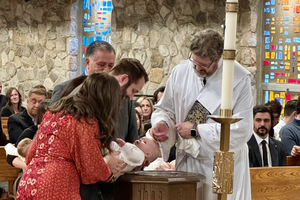A Voice Unheard: The Absence of Deacons at the Synod
COMMENTARY: The inclusion of deacons in the Synod on Synodality is vital for representing the Church’s nature as a communion of persons, each bringing distinct gifts and roles to the fore.

In the heart of the Church’s synodal journey, an essential voice calls, awaiting recognition. The voice of the diaconate remains notably absent in the ongoing dialogue of the Synod on Synodality and particularly those conversations related to the order itself. Imagine if the Synod were to exclude women when it has, as a focus, women.
Similarly, imagine if the Synod excludes the laity when it has, as a focus, the laity. This would be utterly unthinkable in light of the Synod’s call to listen, inviting every voice to participate and shape the journey of the Church. Yet, what is a rapidly growing segment in the Church, one in which its future will be discussed, is completely absent.
This observation is not meant as a criticism but instead as a respectful recognition of a lacuna, a significant gap, which, if filled, would enhance the Church’s journey with a deeper aspect of service and testimony. Beyond the absence of deacons as an order in the previous synodal session, is the absence of the theology of the diaconate and, equally important, the lived experience of deacons.
As a deacon/theologian, one who has served as a member of the 2020 Pontifical Commission on Women and the Diaconate, it is my desire to bring this matter to light. It is my hope and prayer that it will resonate with the hearts of all Catholics, particularly my fellow deacons, as well as our bishops and priests, who themselves share in the one diakonia of Christ.
Grounded in the sources of divine Revelation, the diaconate holds a unique and irreplaceable role within the Church. Deacons are ordained to serve, embodying the Church’s sacramental life alongside its call to service. This vocation is a living bridge between the altar and the needy, between the Church’s worship and its mission to serve the marginalized. The absence of deacons in the synodal conversations is a gap that deprives the Church of the fullness of its identity — a community where service is essential to its mission.
The inclusion of deacons in the Synod is vital for representing the Church's nature as a communion of persons, each bringing distinct gifts and roles to the fore. As St. Ignatius of Antioch in the second century observed in his Letter to the Trallians:
“Let everyone respect the deacons as Jesus Christ, the bishops as the image of the Father, and the presbyters as the senate of God and the assembly of the apostles. Apart from these, there is no Church.”
In light of this, a respectful and heartfelt letter has been prepared for His Eminence Cardinal Mario Grech, General Secretary of the Synod of Bishops. This letter, and the signatures accompanying it, is a gesture of our collective desire to ensure that the diaconate's voice is heard within the synodal process. It reflects our commitment to the Church's journey, emphasizing that the presence of deacons in these conversations is not merely beneficial but essential for a holistic representation of the Church's mission and identity.
This initiative is not a petition nor a form of activism but a symbol of our shared respect and support for the Church's synodal journey. It is an expression of our commitment to accompany the Church prayerfully through this process. I warmly invite all bishops, priests and deacons, who feel moved by this effort to join us. United, we will present our collective support to Cardinal Grech, representing our solidarity and earnest wish to include the diaconate's perspective in the Church's synodal dialogues.
To participate and learn more, I encourage you to visit Diaconal Ministries. Your support, whether through joining this initiative or through prayer, is a testament to the strength and diversity of the Church, affirming the indispensable role of deacons in embodying Christ the Servant within our communities.
As we move forward on this synodal journey together, let us remember that the Church, at its core, is a communion of diverse vocations, each essential to the whole. The inclusion of the diaconate in the Synod is not merely about representation; it is about enriching the Church's dialogue with the theology and lived experience of service that deacons uniquely embody. It is a call to ensure that the voice of Christ the Servant is clearly and unambiguously heard, guiding us to be a Church of open doors, open ears, and open hearts.
- Keywords:
- catholic deacons
- synodal way

















